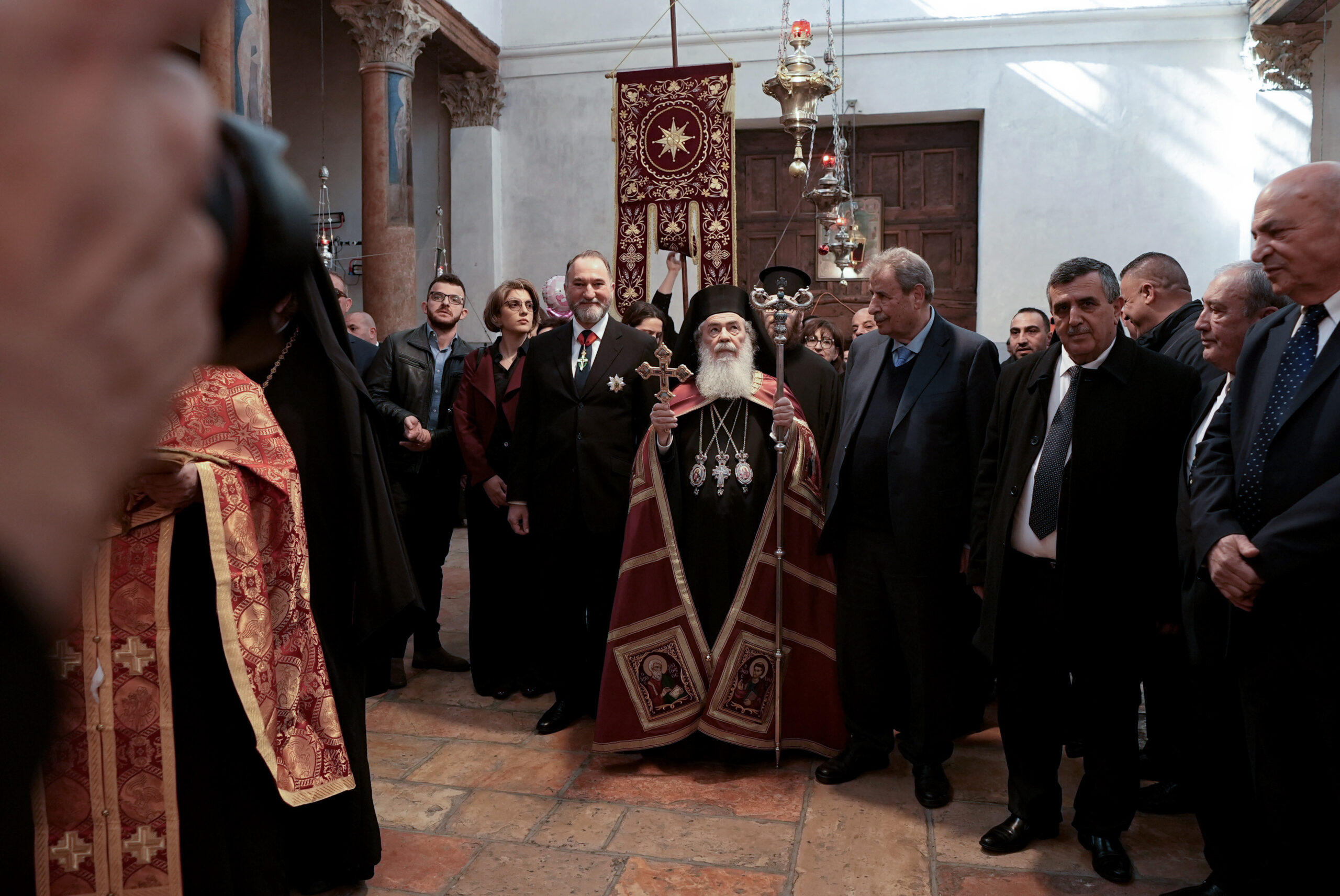In yet another inaccurate and libelous attack on the Jewish State, the Patriarchate of Jerusalem recently published a statement, “The Churches of Jerusalem Call for Urgent Action to End Gaza’s Suffering and Protect the Faithful,” that:
- Inaccurately describes the “sanctified” nature of the Holy Land.
- Falsely accuses the State of Israel of engaging in “repeated assaults on the churches in Gaza and on the Ahli Arab hospital.”
- Misrepresents a dispute between Israeli government officials and church authorities over tax policy as a “grave threat […] to the ancient patrimony of the Churches.”
Inaccurate Description
The Holy Land was Sanctified by the Life, Crucifixion, and Resurrection of Jesus Christ
The published statement describes the Holy Land as “sanctified by the life, crucifixion, and glorious resurrection of our Lord Jesus Christ.” However, the Hebrew Bible, whose books are included in the Christian canon, identifies the land as sanctified by God long before the events associated with Jesus transpired.
For example, the sanctity of the land is evident in Leviticus 18:24-28, which describes behavior that can cause the land to become defiled. If the land had not already been sanctified, it would not be able to become defiled. The holiness of the land can also be inferred from language found in the biblical Song of the Sea celebrating Israel’s journey from Egypt to “your holy abode” (Ex. 15:13) (traditionally understood as the land of Israel) and “the mountain of your own possession…the sanctuary, O Lord, that your hands have established” (Ex. 15:17) (traditionally understood as the city of Jerusalem).
False Accusations
The State of Israel Has Targeted Churches and Ahli Arab Hospital
One of the statement’s false accusations is that the State of Israel has engaged in “repeated assaults” on churches and a hospital in Gaza.
Holy Family Church in Gaza
In contradiction to the claim that Israel deliberately targeted Holy Family Church in Gaza, an Israeli probe found the church was hit by a misfired munition during Israeli military activity conducted near the church. The Israeli army has since reinforced its “guidelines for using fire near religious and sensitive sites.”
Historic Taybeh Church
Contrary to the statement’s allusion to an alleged Israeli assault on a historic church in Taybeh (which is not in Gaza, but in what the statement refers to as the “West Bank”), no evidence exists of a fire in the church, which appears undamaged.
The one piece of evidence showing settler involvement indicates it was settlers who sought to put out the fire that also reportedly threatened an Israeli farmer’s land. One report recounted how an Israeli shepherd who attempted to extinguish the fire was attacked by Palestinians: “[H]e was in the field with his animals when a fire ignited a few meters away. He alerted the farm owner and tried to extinguish the flames with his shirt—only to be confronted by Palestinians emerging from the cemetery, shouting and throwing objects at him.”
Ahli Arab Hospital
The statement’s allegation that the Jewish State assaulted Ahli Arab hospital is also false. In fact, intelligence agencies of the United States, the United Kingdom, and France identified an errant Palestinian rocket, not Israeli military activity, as the cause of the 2023 explosion in the hospital parking lot.
Israel Deliberately Starves Gazans
Another false charge leveled against Israel is that the Jewish State deliberately starves Gazans. While hunger does exist in Gaza, Israel has allowed food to enter Gaza at high rates, with approximately 4,000 calories—about twice the recommended daily caloric intake—per person entering the territory each day between May 19 and August 12, 2025. During that period, more than 182,000 tons of aid entered Gaza, the vast majority of which was food.
However, much of this food has been looted by terrorists. The United Nations acknowledged this reality in their recent statement, in which they stated 88% of aid trucks were “intercepted” by mobs or armed men in the territory. Hamas terrorists have not only stolen a substantial amount of aid intended for Gazan civilians, but also disguised themselves in civilian clothing, complicating the delivery of aid to actual civilians.
Misrepresentation
Israeli Tax Policy Poses a Grave Threat to Churches
The statement from the Patriarchate misrepresents a longstanding dispute between Israeli government officials and church authorities over Israeli tax policy as a “grave threat to Churches.”
In fact, far from threatening Churches, the Declaration of Independence of the State of Israel expresses a commitment to “guarantee freedom of religion” and “safeguard the Holy Places of all religions.”
In the case alluded to in the statement, the Jerusalem Municipality maintains the Patriarchate “failed to settle its property tax debts for assets not used as houses of worship.” In other words, taxes do not target buildings used for worship, but rather assets not used for worship.
Instead of seeking to resolve the dispute with Israeli government officials by behaving like Jesus, who refused to shun tax collectors and engaged in dialogue with those with whom he disagreed, the Patriarchate reportedly failed to resolve the dispute despite Israeli “efforts at dialogue and engagement” and “ignored letters from the [Jerusalem] municipality” dealing with the matter.
Conclusion
In the statement, Patriarch Theophilos III employed Jesus’ statement: “Blessed are the peacemakers, for they shall be called children of God” (Matt. 5:9).” However, it is difficult to see how a statement that does not mention or condemn Hamas even once – while singling out the Jewish State for condemnation through the use of libels, inaccurate descriptions, false accusations, and misrepresentation – helps to further the cause of peace.
** This article was originally published in the Jewish Journal of Los Angeles and shared with us by the author



